Biographies of Yale’s First Women Ph.D.’s
Elizabeth Deering Hanscom (1865–1960)
English
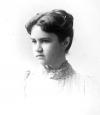 Born in Maine, Elizabeth Deering Hanscom earned bachelor’s and master’sdegrees from Boston University. Her dissertation analyzed the Middle English poem PiersPlowman by William Langland. She joined the English faculty at Smith after graduating from Yale and taught there for thirty-eight years, becoming a professor in 1905. Hanscom was elected to the Council of the American Association of University Professors, which was established in 1915 to ensure academic freedom for faculty members. She pioneered the study of American literature at Smith and published several books including The Friendly Craft: A Collection of American Letters. Hanscom was active in the suffragist movement and championed the intellectual seriousness of women’s colleges. When she died in 1960 at the age of 94, her New York Times obituary noted that she had “introduced the study of American Literature at Smith College in 1988, at a time when the subject was not studied generally in American institutions of higher learning.”
Born in Maine, Elizabeth Deering Hanscom earned bachelor’s and master’sdegrees from Boston University. Her dissertation analyzed the Middle English poem PiersPlowman by William Langland. She joined the English faculty at Smith after graduating from Yale and taught there for thirty-eight years, becoming a professor in 1905. Hanscom was elected to the Council of the American Association of University Professors, which was established in 1915 to ensure academic freedom for faculty members. She pioneered the study of American literature at Smith and published several books including The Friendly Craft: A Collection of American Letters. Hanscom was active in the suffragist movement and championed the intellectual seriousness of women’s colleges. When she died in 1960 at the age of 94, her New York Times obituary noted that she had “introduced the study of American Literature at Smith College in 1988, at a time when the subject was not studied generally in American institutions of higher learning.”Margaretta Palmer (1862–1924)
Mathematics
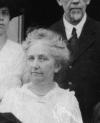 Margaretta Palmer earned her Ph.D. in mathematics, but her dissertation and life’s work were on astronomy. She is believed to be the first woman ever to earn a doctorate in that field. Born in Branford, Connecticut, Palmer received her B.A. from Vassar in 1887. After working briefly in the Vassar Observatory and as an instructor in Latin, she was hired as a research assistant in the Yale Observatory, and she returned to this post after receiving her Ph.D. Her dissertation, “Determination of the Orbit of Comet 1847 VI,” was a study of the comet discovered by the pioneering astronomer Maria Mitchell, her undergraduate mentor. It was published in 1893 in Transactions of the Astronomical Observatory of Yale University. Palmer, whose specialty was computational astronomy, also published a number of articles in Astronomical Journal and several pieces on religious education.
Margaretta Palmer earned her Ph.D. in mathematics, but her dissertation and life’s work were on astronomy. She is believed to be the first woman ever to earn a doctorate in that field. Born in Branford, Connecticut, Palmer received her B.A. from Vassar in 1887. After working briefly in the Vassar Observatory and as an instructor in Latin, she was hired as a research assistant in the Yale Observatory, and she returned to this post after receiving her Ph.D. Her dissertation, “Determination of the Orbit of Comet 1847 VI,” was a study of the comet discovered by the pioneering astronomer Maria Mitchell, her undergraduate mentor. It was published in 1893 in Transactions of the Astronomical Observatory of Yale University. Palmer, whose specialty was computational astronomy, also published a number of articles in Astronomical Journal and several pieces on religious education. Charlotte Fitch Roberts (1859–1917)
Chemistry
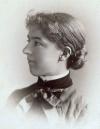 Charlotte Fitch Roberts received her bachelor’s degree in 1880 from Wellesley, where she went on to become an associate professor of chemistry even before earning her doctorate. Her dissertation, published in 1896 as the textbook The Development and Present Aspects of Stereo-Chemistry, was celebrated by Yale chemistry professor Frank Gooch as “the clearest exposition of which we have knowledge of the principles and conditions of stereochemistry.” Roberts became a full professor at Wellesley in 1896 and taught there until her death. Rather than conducting lab research, she devoted much of her scholarship to the development of ideas and the history of chemistry. A fellow of the American Association for the Advancement of Science, she was described by Wellesley’s alumnae magazine as “one of the pioneers in America of the ‘New Chemistry.’” A chemistry professorship at Wellesley now bears her name.
Charlotte Fitch Roberts received her bachelor’s degree in 1880 from Wellesley, where she went on to become an associate professor of chemistry even before earning her doctorate. Her dissertation, published in 1896 as the textbook The Development and Present Aspects of Stereo-Chemistry, was celebrated by Yale chemistry professor Frank Gooch as “the clearest exposition of which we have knowledge of the principles and conditions of stereochemistry.” Roberts became a full professor at Wellesley in 1896 and taught there until her death. Rather than conducting lab research, she devoted much of her scholarship to the development of ideas and the history of chemistry. A fellow of the American Association for the Advancement of Science, she was described by Wellesley’s alumnae magazine as “one of the pioneers in America of the ‘New Chemistry.’” A chemistry professorship at Wellesley now bears her name.Cornelia H.B. Rogers (1862–1907)
Romance Languages and Literatures
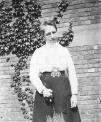 Cornelia Hephzibah Bulkley Rogers, whose sister was also among the first seven women to earn Yale Ph.D.s, grew up in Bridgeport, Connecticut. Her father, Samuel Towner Rogers, class of 1844; and her great-grandfather, Medad Rogers, class of 1777, were Yale College alumni. She graduated from Wellesley in 1884 and then studied in Italy and Spain. An expert in Old Spanish as well as Italian and French, Rogers earned the first Ph.D. awarded in Romance Languages at Yale. Her dissertation, written in Spanish, was titled “Sinalefa, sineresis, e hatio en los romances del Cid.” Her professors noted that she was “exceptionally well prepared” for doctoral work, with “a remarkable fluency and accuracy” in Spanish. Rogers became an instructor in French and Italian at Vassar in 1898 and was appointed associate professor in 1902. She also provided translations for the American Academy of Political and Social Science.
Cornelia Hephzibah Bulkley Rogers, whose sister was also among the first seven women to earn Yale Ph.D.s, grew up in Bridgeport, Connecticut. Her father, Samuel Towner Rogers, class of 1844; and her great-grandfather, Medad Rogers, class of 1777, were Yale College alumni. She graduated from Wellesley in 1884 and then studied in Italy and Spain. An expert in Old Spanish as well as Italian and French, Rogers earned the first Ph.D. awarded in Romance Languages at Yale. Her dissertation, written in Spanish, was titled “Sinalefa, sineresis, e hatio en los romances del Cid.” Her professors noted that she was “exceptionally well prepared” for doctoral work, with “a remarkable fluency and accuracy” in Spanish. Rogers became an instructor in French and Italian at Vassar in 1898 and was appointed associate professor in 1902. She also provided translations for the American Academy of Political and Social Science.Sara Bulkley Rogers (1864–1907)
History
Sara Bulkley Rogers, sister and Yale classmate of Cornelia Rogers, received her B.A. from Columbia in 1889 through the program that would later become Barnard College, and her M.A. in history from Cornell. Her Yale dissertation was titled “The Rise of Civil Government and Federation in Early New England.” After earning her Ph.D., Rogers traveled and studied constitutional theory in Europe. When she returned to the United States, she continued doing research on political history, focusing on tenant’s rights in New York. She also wrote fiction, publishing stories in the New-York Evening Post, the Commercial Advertiser, and other periodicals. Her 1897 novel, Life’s Way, was published under the pen name Schuyler Shelton. In 1900 she published a book of short stories, Ezra Hardman, M.A., of Wayback College, and Other Stories, under her own name. We have yet to find any photographic trace of Sara Rogers.
Mary Augusta Scott (1851–1918)
English
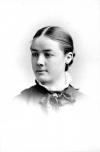 Born in Dayton, Ohio, Mary Augusta Scott graduated from Vassar with a B.A. and M.A. in 1876. Before entering Yale in 1892, she studied at the University of Cambridge and Johns Hopkins. Her dissertation was titled “The Elizabethan Drama, especially in its Relation to the Italians of the Renaissance,” and she remained immersed in the scholarship of that period all her life. In 1902 Scott became an English professor at Smith College. She was a prolific writer, contributing to literary and academic journals like The Dial, an influential outlet for modernist literature. She also published five books, including Elizabethan Translations from the Italian and The Essays of Francis Bacon. Scott left a bequest to Vassar, and a chair of English there is named for her.
Born in Dayton, Ohio, Mary Augusta Scott graduated from Vassar with a B.A. and M.A. in 1876. Before entering Yale in 1892, she studied at the University of Cambridge and Johns Hopkins. Her dissertation was titled “The Elizabethan Drama, especially in its Relation to the Italians of the Renaissance,” and she remained immersed in the scholarship of that period all her life. In 1902 Scott became an English professor at Smith College. She was a prolific writer, contributing to literary and academic journals like The Dial, an influential outlet for modernist literature. She also published five books, including Elizabethan Translations from the Italian and The Essays of Francis Bacon. Scott left a bequest to Vassar, and a chair of English there is named for her. Laura Johnson Wylie (1855–1932)
English
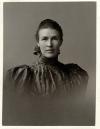 Born in Milton, Pennsylvania, Laura Johnson Wylie was valedictorian of her class at Vassar in 1877. She went on to teach Latin and English at the Packer Institute in Brooklyn for fourteen years prior to pursuing graduate work at Yale. Her dissertation, “Studies in the Evolution of English Criticism,” was published by Ginn & Company in 1894. After graduating from Yale, Wylie returned to Vassar, where she became head of the English department within two years. She published Social Studies in English Literature in 1916; wrote the introduction to the 1917 edition of George Eliot’s first novel, Adam Bede; and edited a volume of Gertrude Buck’s poetry and plays. She remained at Vassar for thirty years, until her retirement in 1924. Wylie was a leader in the women’s suffrage movement, serving as president of New York’s Dutchess County Suffrage Association from 1910 to 1918. After gaining the vote, she helped found the Women’s City and Country Club, serving as its president from 1918 to 1928.
Born in Milton, Pennsylvania, Laura Johnson Wylie was valedictorian of her class at Vassar in 1877. She went on to teach Latin and English at the Packer Institute in Brooklyn for fourteen years prior to pursuing graduate work at Yale. Her dissertation, “Studies in the Evolution of English Criticism,” was published by Ginn & Company in 1894. After graduating from Yale, Wylie returned to Vassar, where she became head of the English department within two years. She published Social Studies in English Literature in 1916; wrote the introduction to the 1917 edition of George Eliot’s first novel, Adam Bede; and edited a volume of Gertrude Buck’s poetry and plays. She remained at Vassar for thirty years, until her retirement in 1924. Wylie was a leader in the women’s suffrage movement, serving as president of New York’s Dutchess County Suffrage Association from 1910 to 1918. After gaining the vote, she helped found the Women’s City and Country Club, serving as its president from 1918 to 1928. Contact Us
The Yale Women Faculty Forum
205 Whitney Avenue, Suite 301B
New Haven, CT 06511
(203) 436-2978
wff@yale.edu
Subscribe to our Newsletter
Click this link to join our mailing list. You will need your NetID.
